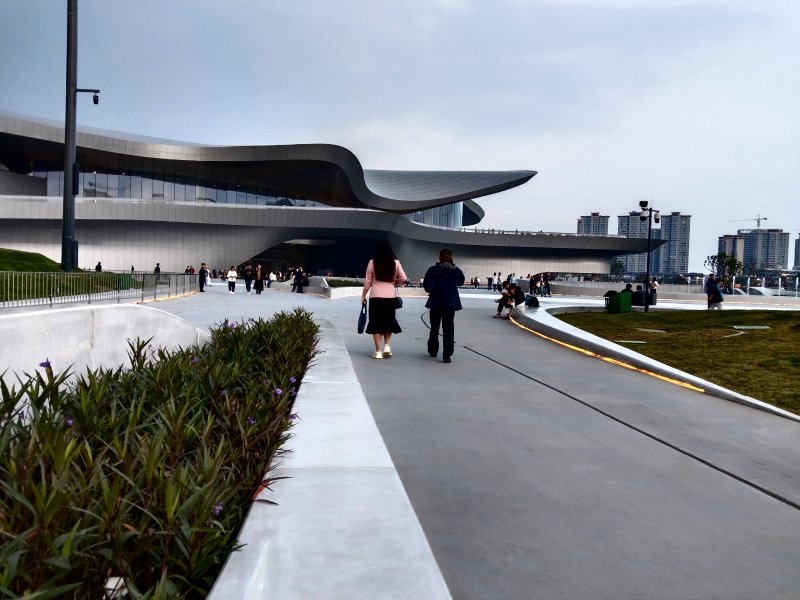 Journey to Chengdu:
Journey to Chengdu:
My Experience of the 2023 WorldCon
by
David Wesley Hill
MY JOURNEY TO Chengdu began on October 12 with a two hour drive from my home in rural North Carolina to Raleigh. I flew to JFK and connected with a Cathay Pacific flight to Hong Kong. That took sixteen hours. Worse, I had a sixteen hour lay-over in Hong Kong, which I spent wandering the airport like a wraith, eventually napping on a couch not far from the gate where I finally boarded the plane that carried me the last thousand miles of my trip.
I arrived at Chengdu Tianfu airport around noon on October 15. This was my third visit to Chengdu. In 1997 and in 2007 I had been invited to speak at international conferences on science fiction and fantasy sponsored by my Chinese publisher, the magazine Science Fiction World.
On this visit, however, I was not there to talk. I was there to listen. I had been asked to attend a WorldCon panel titled “Even If Everything Is a Dream, Dream Better: David Hull’s (sic) Science Fiction World.”
A panel about me. I hoped it wouldn’t be a roast.
Tianfu, a newish airport, was an hour’s drive outside the city. I shared a cab into Chengdu via an expressway, first passing through a ring of round green hills, and then past rank upon rank of huge buildings rising skyward like an army of Titans. I am from Manhattan, from New York City, but Chengdu made me feel like a visitor from a small town. The city was home to over twenty million people. The scale was indescribable. Even so, at ground level, something of old Chengdu lingered, kept alive in busy alleys and back streets, shaded by an urban forest of verdant trees growing at the feet of the towering monoliths. An elderly lady swept the plaza of an ultra-modern building with a straw broom whose design had not varied for a thousand years. In every direction streams of men and women went about their business as they always have, shopping, gossiping, selling something, grabbing a bite to eat or a cold pint, hurrying somewhere important. People in Chengdu were busy.
I was put up at the Wyndham hotel, a twenty-minute ride by shuttle bus from the Chengdu Science Fiction Museum (photo top right), where the WorldCon was being held.
The WorldCon was a big deal in Chengdu.
It would be the first time ever that the World Convention of Science Fiction was held in China, and only the second time that the convention had been held in Asia, when Japan had hosted the event back in 2007.
How big a deal was it?
The official WorldCon mascot was a vaguely eerie bionic panda in a spacesuit. Giant pictures—and public sculptures—of this mutant bear were prominently displayed along the route of the shuttle bus. The museum itself was a vast fluid structure resembling an architectural star ship Enterprise on steroids. The main auditorium, known as the Hugo Hall, held at least—I’m low-balling the estimate here—four thousand people. The main lobby area was an open space large enough to accommodate the statue of a robot dog many stories high, not to mention hundreds of schoolchildren bussed in on class trips. At any given time during the day, four or five events were going on in the museum itself or at the nearby Sheraton hotel.

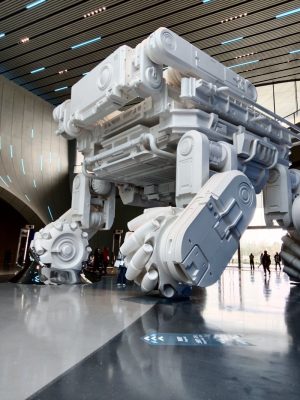

On the morning of October 18 a film crew from the Sichuan TV show “Panda Wandering” began filming an episode about me. I am still not exactly sure why they thought my story would entertain their audience, but I was willing to humor them, if only to oblige my hosts. Since it was well known in Chinese SF circles I once was an executive chef, and that I loved Sichuan cuisine, I was treated to a family style lunch at a local restaurant. My reactions were filmed as I enjoyed such dishes as Steamed Pork and Pumpkin, Braised Cabbage with Cracklings, and Cornbread Cups with Sichuan Pickle. Then I was filmed exploring a museum in the Pixian District, far from the city center, where Sichuan Hot Bean Paste, an essential culinary ingredient, was still being made according to traditional methods hundreds of years old.
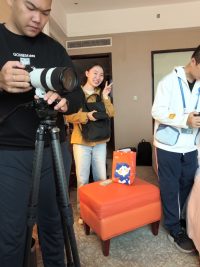
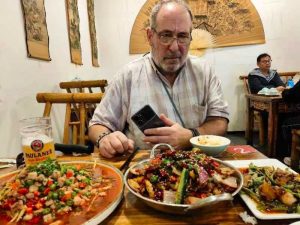

WorldCon officially opened that evening, with a production in Hugo Hall. The ceremony was as flashy and as choreographed as a Broadway musical, with mind-blowing audio-visual displays, dance numbers, lots of little kids being cute, and many, many introductions. As this was the only WorldCon I had ever attended, I had nothing to compare it with, but I suspected the science fiction world had never seen a show as extravagant as the spectacle before me in Hugo Hall.
As I was leaving the museum after the show, I bumped into several friends among the crowd exiting the venue. Wu Yan, a noted scholar of science fiction, whom I had first met in Beijing in 1997. Carolyn Clink, an SF poet and the wife of Chengdu WorldCon Guest of Honor Robert J. Sawyer. Zhao Haijong, an early SF fan who was now an academic and SF author with an international reputation. To my delight, I also ran into Yang Xiao, who had been editor of Science Fiction World for many years, and published the short story that made me famous in China, “The Curtain Falls.” Almost thirty years had passed since we had last seen one another. A happy moment.
(Left to right: Yang Xiao, David Wesley Hill, Zhao Haijong)

The hotel restaurant was, I learned, a good place to meet people during the convention, The Wyndham put out an expansive breakfast buffet, including Sichuan pickles, soy eggs, sliced cold meats, fried rice and chow fun, dumplings, noodles, and bao cooked to order, both rice and pumpkin congee, fried spring rolls and sweet potato cakes, and … and … and … Enough. You get the idea. Anyway, as the saying should go, gluttony loves company, and soon I was joined for breakfast each morning by an interesting collection of rascals and reprobates, including (in no particular order): Louis Savy, founder and director of the Sci Fi London film festival. Gerald Brandt, a Canadian SF novelist, and Roderick Leeuwenhart, a young SF writer from Holland. Richard Man, who won the 2023 Hugo for Best Fan Artist. Mario Dorminsky, an SF film critic and festival director from Portugal. Daniel Salvo, a Peruvian science fiction writer. Jamie Lee Smith, of Rock Star Productions, another cinephile. And Jeremy Szal, an up and coming SF novelist from Australia.
The next day, October 19, still trailed by the film crew, I attended two events at the Sheraton: the opening ceremony of the Sixth China (Chengdu) International SF Conference, which was being held in conjunction with WorldCon, and in the evening, the announcement of China’s most prestigious science fiction prizes, The Galaxy Awards. During the day, I explored exhibitions set up in the Science Fiction Museum, which included marketing for new SF video games, movies, and books. One cool display showed off a 3D laser printer creating some futuristic device. I counted at least a half dozen interactive promotions involving virtual reality goggles. Never got a chance to try one on for size, though, for that would have meant fighting for a place in line with literally hundreds of middle schoolers.
 Also, that afternoon I was volunteered to hold a meet and greet with the press, and I was given a seat and handed a microphone, and for an hour I fielded questions through a translator from a dozen reporters from various news outlets while a hundred or so people looked on curiously. Most of the questions involved my relationship with Chinese science fiction, and what I thought about the ongoing festivities. I had answers prepared for such questions, but I was definitely not prepared for the moment when a young journalist introduced herself to me, and showed me the autograph book I’d signed for her way back in 1997, when she was a girl. It floored me that she had saved my signature for almost thirty years. It was humbling to realize that I’d left such an impression on another person’s life. I hoped I had somehow set a good example.
Also, that afternoon I was volunteered to hold a meet and greet with the press, and I was given a seat and handed a microphone, and for an hour I fielded questions through a translator from a dozen reporters from various news outlets while a hundred or so people looked on curiously. Most of the questions involved my relationship with Chinese science fiction, and what I thought about the ongoing festivities. I had answers prepared for such questions, but I was definitely not prepared for the moment when a young journalist introduced herself to me, and showed me the autograph book I’d signed for her way back in 1997, when she was a girl. It floored me that she had saved my signature for almost thirty years. It was humbling to realize that I’d left such an impression on another person’s life. I hoped I had somehow set a good example.
The next day I had one of the top ten meals of my life. Wu Yan invited me to a private luncheon he was hosting to honor the Japanese delegation to WorldCon, including the SF writer Taiyo Fujii, and the chairperson of the Science Fiction and Fantasy Writers of Japan, Hirotaka Osawa. Also in attendance were such Chinese SF luminaries as Han Song and Fei Dao, who had translated my address, “Revisiting the Future,” to the International Conference on Science Fiction and Fantasy in 2007. Even better, I was seated next to a long-time friend: Qin Li, who had been my personal aide and translator back in 1997, and who was now Vice President of Sichuan Publishing, one of the largest publishing companies in China.
Enough name dropping, Dave. What about the food?
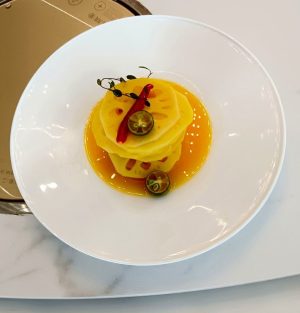 OK, OK. We were all seated at a large round table with a glass Lazy Susan rotating slowly in the center. There were at least twenty different dishes, each one as meticulously presented as a jewel displayed upon silk. The starting course was a beef or lamb broth as clear and pure as mountain water but robustly meaty and flavored with a slight hint of turmeric. Poached lotus root with a citrus dressing (photo at right). Mud crabs stewed with fresh ginger. Cold sliced pork in aspic jelly. Chicken with Sichuan red oil. Bubbling earthenware crocks full of fresh noodles and tofu. And my favorite of favorites … perfectly prepared roast pork, each bite containing a bit of crackling, a bit of fat, and a bit of meat … a Platonic mouthful of taste and texture. The best I’ve ever had.
OK, OK. We were all seated at a large round table with a glass Lazy Susan rotating slowly in the center. There were at least twenty different dishes, each one as meticulously presented as a jewel displayed upon silk. The starting course was a beef or lamb broth as clear and pure as mountain water but robustly meaty and flavored with a slight hint of turmeric. Poached lotus root with a citrus dressing (photo at right). Mud crabs stewed with fresh ginger. Cold sliced pork in aspic jelly. Chicken with Sichuan red oil. Bubbling earthenware crocks full of fresh noodles and tofu. And my favorite of favorites … perfectly prepared roast pork, each bite containing a bit of crackling, a bit of fat, and a bit of meat … a Platonic mouthful of taste and texture. The best I’ve ever had.
My turn in the barrel came later that day. The panel was held in the Earth Hall of the Science Fiction Museum, a room large enough to accommodate about two hundred people. On the dais with me were Wu Yan; Yao Haijun, the current editor in chief of Science Fiction World; and Tan Kai, now retired, a former editor of the magazine. Mr. Tan gave a synopsis of my story, “The Curtain Falls,” and discussed the impact it had on Chinese science fiction.
(Left: Panelists Yao Haijun, Tan Kai, me, Wu Yan — Right: me, Yao Haijun at the SFW offices)
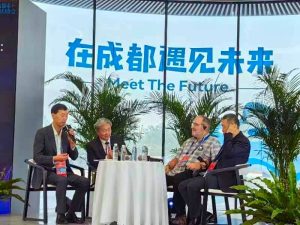
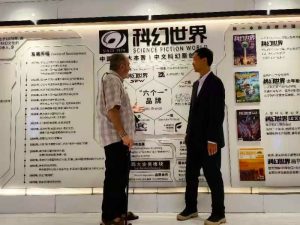
I wrote the story, a dire environmental parable, in the early 1990s, when it was feared that a growing hole in the ozone layer over Antarctica would make going outside dangerous due to increased UV exposure, and perhaps trigger a climatological collapse. In the United States the story was published in a small anthology, Green Echo, but it found a wide audience in China after being published in Science Fiction World and then reprinted in Readers Magazine, which had a circulation of ten million. Also, hundreds of thousands of free copies of the story were given out in Beijing by the government to raise awareness of the danger to the ozone layer.
Unfortunately, as Tan Kai continued speaking, as I had feared he might, he mentioned that both he and Yao Haijun had been guests of mine while visiting the States many years ago. At the time, I had lived in a one room studio apartment, which provided little in the way of privacy for me and my visitors. Thanks to Tan Kai’s reminiscences, my snoring has now become infamous on two continents.
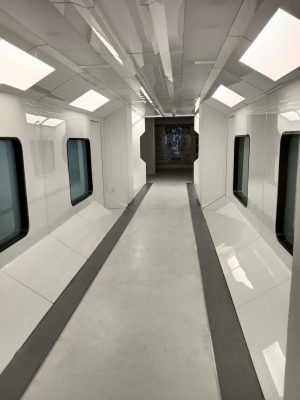
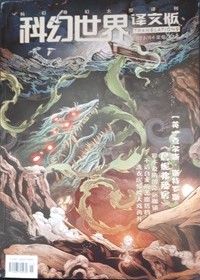 The 2023 Hugo awards were announced the following day, October 21, and the closing ceremonies took place on the 22nd. I remained in Chengdu for some time afterward, though. With the assistance of a young SFW editor, Jaz, who spoke impeccable English, I visited the offices of Science Fiction World. The entrance to the magazine had been given a make over and now resembled nothing so much as the entryway to a spaceship. I talked with Yao Haijun about SF publishing in China, and then we went out for lunch at a nearby restaurant favored by the SFW office staff. Next, Jaz brought me to a shop where I was able to purchase a hand-made Chinese cleaver to add to my collection of knives. And then came perhaps the most memorable moment of the entire trip. Qin Li picked me up at my hotel and drove me to Yang Xaio‘s apartment, and we shared a home cooked lunch together and reminisced about old times and good times and the friends we have made and lost over the years.
The 2023 Hugo awards were announced the following day, October 21, and the closing ceremonies took place on the 22nd. I remained in Chengdu for some time afterward, though. With the assistance of a young SFW editor, Jaz, who spoke impeccable English, I visited the offices of Science Fiction World. The entrance to the magazine had been given a make over and now resembled nothing so much as the entryway to a spaceship. I talked with Yao Haijun about SF publishing in China, and then we went out for lunch at a nearby restaurant favored by the SFW office staff. Next, Jaz brought me to a shop where I was able to purchase a hand-made Chinese cleaver to add to my collection of knives. And then came perhaps the most memorable moment of the entire trip. Qin Li picked me up at my hotel and drove me to Yang Xaio‘s apartment, and we shared a home cooked lunch together and reminisced about old times and good times and the friends we have made and lost over the years.
(Left: SFW Editor Jaz Fixing Mashed Zucchini with Sichuan Spices — Right: Qin Li, David Wesley Hill, Yang Xiao)
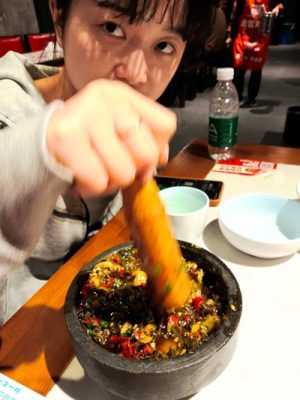
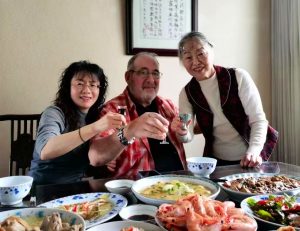
Qin Li was doing the translating since Yang Xiao spoke little English and I only knew two words of Chinese—hello and thank you.
Ni hao and Xièxiè.
“Do you remember when you visited me in New York in 1995?” I asked Yang Xiao.
She nodded.
“You told me I was famous in China.”
“Yes,” she said with a nod. “Very famous.”
“I thought you were crazy.”
“Crazy?” Yang Xiao looked at Qin Li, who translated crazy for her.
“Not crazy,” she said sternly.
After thirty years, I was beginning to believe her.
Soon I would be returning to America.
But for a while longer, I was famous in China.
(Chengdu Science Fiction Museum at night.)

You can watch the short Sichuan TV videos about David Wesley Hill here and here.